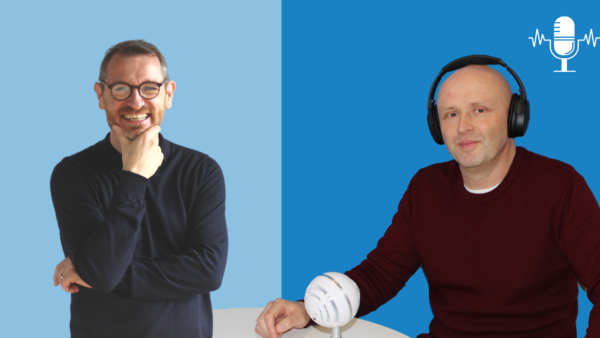Changing habits comes up a lot on people’s to do lists – when we want to keep our NY resolutions, lose weight, get fit, stop smoking, eat healthily and so on. I’ve put out several podcasts on habit forming, including…
- Season2, episode 1: building new habits
- Season 5, episode 3: habit stacking
With the stuff I talk about on these podcasts, it’s usually the case that we’re wanting to change habituated behaviour by adopting new thinking or new behavioural patterns and using our brain’s innate ability to create more efficient neural networks.
(by wrapping myelin around our axons, effectively creating super efficient connections between different parts of the brain and therefore, new behaviour formation)
But some of our habituated patterns of thinking and behaviour go so far back to our early lives that they may well underpin many of our behaviours in later life, wait for it, without us even knowing!
I’m going to be talking today about one way of looking at these drivers of our behaviour, in the context of a psychotherapeutic system called Transactional Analysis, originated by Eric Berne in the 1960s.
Why?
Because I want to talk about whether what our parents gave us as ways of thinking and behaving from the very beginning of our lives are still working for us now.
And if not, what we can do about it.
Now, given the topic I’m covering today, I want to put out a disclaimer – I’m not a psychotherapist, I’m a work psychologist, so I’m talking to you here about a topic which I think is powerful and helpful, but I’m no expert, not by a long stretch, so if you’re interested in what I cover today, my advice is to go seek out some expertise from a qualified psychotherapist, or just read more about TA (Transactional Analysis), maybe even starting with the writings of Eric Berne himself.
Onto drivers – the work of Eric Berne focused mostly on our interactions with others and how these interactions play out based on the roles we take almost by default or in certain contexts, when we’re triggered by other people’s behaviours.
The part of TA I want to focus on though is the underlying drivers that our parents unwittingly gave us early in life because of their own shizzle, what they were taught and how they dealt with the world around them.
In TA world, these are…
- Be perfect
- Please me (or others)
- Be strong
- Try hard
- Hurry up
I remember feeling quite emotional when I read those drivers for the first time – they felt very real, very present, kind of everywhere, like I’d heard them being said to me, and I’d heard them being said by other parents to other children, and I’d heard me saying them to my kids.
So my interest was piqued straight away.
Now these drivers can come originally as I’ve said from our own parents’ experience of the world and may well originate in the values that are passed down to us through the generations as being the best or right ways of dealing with the world around us.

How to change habits
Let’s take each of them in turn and find out more about where they come from, what they mean and how we can deal with them. The idea here is that by knowing what might be driving our behaviour, we can make sure that these drivers are actually working in service to us rather than us continuing to follow the life map our parents gave us without questioning it, even when our drivers are driving us.
First is Be perfect – so this driver probably comes from values like achievement, being right and success. Here, you’re being taught to not make mistakes, not take risks, not be natural or childlike, but be an adult (probably too soon in your early life). And as an adult with this driver, your biggest fear is losing control, so to avoid that, you make sure you build your world on certainties, rules, standards that you can hold yourself and others accountable to.
The benefits of this driver are that you are likely to have a clear purpose, very high standards, be task-oriented and logical. But under stress that might look like being OTT ‘tell-y’ and parent-y and autocratic.
So to reduce your stress, what you can do if you have this driver is remember to appreciate everyone’s contributions and all values, speak to your own feelings rather than play the parent role and laugh at your own rules sometimes so you don’t get stuck on them.
Secondly is Please – please me or please others. Coming from parental values like kindness, service and compassion, you’re being taught not to be assertive or look out for your own needs, that you shouldn’t be important or different and that you shouldn’t say no. As an adult with this driver, you fear being blamed for stuff, for it being your fault, so as an adult you’re always looking to please other people in the hope that you won’t be blamed, ignored or criticised.
Benefits here are that you are likely to be helpful, generous, to nurture others, and enjoy people. But under stress, you might become a rescuer or be passive aggressive – so not agree with other people’s point of view but keep it to yourself for fear of attracting heat.
To deal with this driver, good strategies are to allow yourself and others to be individual and autonomous, not dependent, to accept responsibility for things that you are responsible for, and to listen well.
So with those two drivers in mind, please say Hi to Mum and Dad – my Mum and Dad – Dad gave me Be perfect and Mum, Please others – as ways to be in the world. Not saying these are wrong, just saying that these ‘pointers’ or guides can be difficult to grasp for kids and so can become these systems that might hold us back from developing in some areas if we’re not careful. So what I’m doing personally on this is for Be Perfect – speaking my truth and my feelings and appreciating others more. And for Please others – allowing myself and other important people in my life to be individuals, so I’m not creating dependency by mistake.
The third driver: Be Strong. This one comes from values like courage, reliability and strength. You’re taught not to show your feelings, not to give in (so you might be quite stubborn) and not to ask for help. As an adult, you may fear rejection.
The good stuff is that with this driver, you’ll likely be self-sufficient, reliable and dependable and be helpful to others. And under stress, this might look like coldness, aloofness, going solo and leaving people behind.
To reduce stress and as areas to work on, Be Strong people can usefully learn to take as well as give and be willing to express their needs, even if this does mean risking rejection.
The fourth driver in our list is: Try Hard. This originates from your parents having values like persistence, patience and determination and you being taught never to be satisfied, that your work never ends and that you shouldn’t ever relax. As an adult, you’ll probably be most fearful of failure (and also success, because success also means ending).
Positives here are being a committed hard worker, taking on a lot, being passionate and intense and being committed to righting wrongs. The less positive stuff is that not all the tasks you start will get completed, you might blame external factors for failures and the greatest goals you set may not be reached.
To deal with this one, go for committing to doing rather than trying – I will do this, or I will do that, rather than I’ll try to. Also, be realistic in taking on more, only do what you genuinely can. And be willing to tell the difference between the things you can and can’t change and work within that.
Last driver is: Hurry up. This comes from values such as speed, efficiency and responsiveness and here, you’re being taught not to take long, or think or waste time. As an adult, you may be fearful of the space created by NOT DOING and loss of purpose as a result.
Your assets will be excitement, enthusiasm, multi-tasking, liveliness and adventurousness.
Under stress though, Hurry Up can create panic, anxiety and possibly even a sense of hopelessness. The antidote here, things to try and break out of the driver are to love life for its own sake, taking moments to be mindful and appreciative, not just fill the gaps with more things. Try and be on time and express appreciation to others.
So that’s the list – did you recognise yourself in any of these drivers?
More than one, even more than two? That’s ok.
If there’s anything you felt really spoke to you, habits you’d like to form to maybe break out of those repeat patterns of thought or behaviour that you don’t feel help you any more, well it’s in your control.
Start now – have a listen to my other podcasts on habit formation: Season 2, episode 1 and Season 5, episode 3 and that should get you started.
Good luck getting those drivers heading in your direction, not the other way round.
Why not form a new habit and subscribe to my podcast? Click on your favourite platform below.
Subscribe











